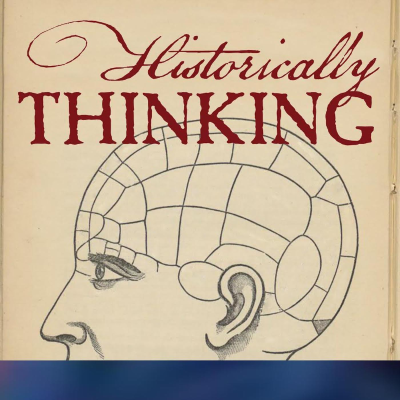
Historically Thinking
Podcast de Al Zambone
Empieza 7 días de prueba
$99.00 / mes después de la prueba.Cancela cuando quieras.

Más de 1 millón de oyentes
Podimo te va a encantar, y no estás solo/a
Rated 4.7 in the App Store
Acerca de Historically Thinking
We believe that when people think historically, they are engaging in a disciplined way of thinking about the world and its past. We believe it gives thinkers a knack for recognizing nonsense; and that it cultivates not only intellectual curiosity and rigor, but also intellectual humility. Join Al Zambone, author of Daniel Morgan: A Revolutionary Life, as he talks with historians and other professionals who cultivate the craft of historical thinking.
Todos los episodios
630 episodiosHis friend the great scholar Desiderius Erasmus referred to Thomas More as “a Man for all seasons.” But which season? Or which Thomas More? Is he an advocate of conscience? A heroic defender of the Catholic faith? A saintly martyr? A fanatical zealot unwilling to listen to cool reason? An amateur inquisitor who lit the night with burning Lutherans and their books, and enjoyed little more than coming home after work for a torture session? Does every era get the Thomas More that it deserves? Thomas More was indeed a man of many twists and turns, a Tudor Odysseus. A Londoner; the grandson of a baker and son of a lawyer; a page in a noble household; an exceptional prose stylist, in Latin or English; a lawyer of exceptional diligence and skill; a guild member; a religious controversialist, able to match Martin Luther in scatology; a subtle humanist of European-wide fame; a poet; a politician; a bureaucrat; a royal advisor; a confessor of the faith; a prisoner; and a martyr. He was all those things, and more besides. With me to talk about the life and times of Thomas More is Joanne Paul, Associate Professor in Early Modern History at the University of Sussex. Her research focuses on the intellectual and cultural history of the Renaissance and Early Modern periods, written widely on Thomas More, William Shakespeare, Machiavelli and Thomas Hobbes. Her most recent book is Thomas More: A Life, which is the subject of our conversation today. For Further Investigation * The web page of Joanne Paul [https://joannepaul.com/] * Thomas More: A Life [https://www.simonandschuster.com/books/Thomas-More/Joanne-Paul/9781639368792] * The last time we talked about the Tudors on Historically Thinking [https://historicallythinking.org/episode-302-tudor-england/] * And the book we talked about with its author [https://www.amazon.co.uk/Tudor-England-History-Lucy-Wooding/dp/0300162723], Lucy E.C. Wooding, which is recommended by Joanne Paul * A very old conversation about the Protestant Reformation [https://historicallythinking.org/episode35/] * Another book by Joanne Paul on Thomas More, but focusing on his thought [https://www.amazon.co.uk/Thomas-More-Classic-Thinkers-Joanne/dp/0745692176/ref=sr_1_4?crid=O7S6M5TRWUYT&dib=eyJ2IjoiMSJ9.tdHrPkxlCGrfXmUDQob0BYxNZSvnIhKslwVizB0Zqx-GIH_cuHzW-HpQ-4OkEjjjlPd4OKfInCT_HKod-93UoP4E1HHKGuSCHfIG4n0XIprZ_8Jkhoi3e2rwW_3BBCP2vrjKlnN8D7NLp_MDARD9tju-Jad8biPmiLx6zWnWVS00JkUVHMeHd97omljHpIMUF-WZbHOvonzkjnxv3upD1g8hdtTir1BROONJ0li6sMY.An1x5a1EY7P0_xKDg5WVYCl8dX3YqR-LkArEwp_MJDE&dib_tag=se&keywords=joanne+paul+thomas+more&qid=1750248177&s=books&sprefix=thomas+more+joanne+%2Cstripbooks%2C128&sr=1-4] * John Guy, Thomas More [https://www.amazon.co.uk/Thomas-More-Reputations-John-Guy/dp/0340731397] * Thomas More, Utopia, ed. by Joanne Paul [https://global.oup.com/academic/product/utopia-9780198860204?cc=us&lang=en&]
In September 1945, various factions within the Soviet state were determining how the new nation of North Korea would be ruled, and who would be its leader. In late September a list was generated of potential leaders, and passed to higher authorities. The name Kim Il-Sung was not on it. At the time the future dictator of the Democratic Peoples’ Republic of Korea was recently returned to Korea, where he had not been for years if not decades, and aspired to be the vice-Mayor of Pyongyang. But extraordinarily by late October, this obscure figure who had not had any rank higher than battalion commander in the Soviet Army was recommended as the leader of the North Korean proto-government. By the middle of December he was the highest ranking official in the Korean Communist Party; and on 8 February he was officially made the head of the North Korean proto-government. In point of fact Kim would not be in charge of both party and government until 1949. But this “accidental tyrant”, as my guest Fyodor Tertitsky titles him, had a genius for committee politics, the manipulation of factions, and personal survival. Calamities brought about by his own choices became opportunities for the elimination of his enemies and the establishment of ever-greater powers, until by his death his family was in the seemingly unassailable position in which it remains today, decades later. Fyodor Tertitskiy studies North Korean political, social and military history. He has been living in South Korea for more than a decade. His previous books, authored several books in English and Korean, include The North Korean Army: History, Structure, Daily Life, and Soviet-North Korean Relations During the Cold War. His most recent book is The Accidental Tyrant: The Life of Kim Il-Sung, which is the subject of our conversation today. For Further Investigation * Articles by Fyodor Tertitskiy for NK News [https://www.nknews.org/content_author/fyodor-tertitskiy/] * A previous conversation related to this one is in Episode 212: The Perennial Russian Pivot to Asia [https://historicallythinking.org/episode-212-the-perennial-russian-pivot-to-asia/]. For a history of the Chinese Communist Party, see Episode 213: From Rebel to Ruler. [https://historicallythinking.org/episode-213-from-rebel-to-ruler/] For tips on how to overcome your closest enemies, see Episode 265: How to Win a Power Struggle [https://historicallythinking.org/episode-265-how-to-win-a-power-struggle/]. * Buzo, Adrian. The Guerilla Dynasty: Politics And Leadership In North Korea. Rev. ed. London: Routledge, 2018. * Demick, Barbara. Nothing to Envy: Ordinary Lives in North Korea. New York: Spiegel & Grau, 2009. * Lankov, Andrei. North of the DMZ: Essays on Daily Life in North Korea. Jefferson, NC: McFarland & Company, 2007. * Oh, Kongdan, and Ralph C. Hassig. North Korea through the Looking Glass. Washington, D.C.: Brookings Institution Press, 2000.
Joseph Smith was the founder of the Church of Jesus Christ of Latter Day Saints, known by those outside the church during his life and today as the Mormons. But Joseph Smith was many things besides: the child of a struggling family gradually moving westward in search of opportunity, a day laborer, visionary, seer; treasure hunter; translator; revelator; prophet; elder, banker, prisoner, wrestler, real estate speculator, polygamist, Lieutenant General, Master Mason, Mayor, and martyr. “America,” wrote Ralph Waldo Emerson in 1844, “is the country of the future…[a] country of beginnings, of projects, of vast designs and expectations.” My guest John Turner observes that Joseph Smith might not have been what Emerson had in mind when he spoke of new beginnings and bold projects. But those were part of his life, in addition to vast designs and great expectations. Indeed, it is not too much to say that few nineteenth century Americans have an enduring legacy that can compare to Joseph Smith’s. Yet John Turner’s new book Joseph Smith: The Rise and Fall of an American Prophet [https://yalebooks.yale.edu/book/9780300255164/joseph-smith/] also describes how this very untypical man was yet absolutely typical of his times. From his religious awakening among the religious revivalism of western New York, to his founding of utopian communities in the midwest, to his dietary concerns, and even to his experience of brutal mob violence that amounted to religious pogroms against his church, Smith’s experiences–and those of his followers–were far from atypical. John G. Turner is professor of religious studies and history at George Mason University [https://religiousstudies.gmu.edu/people/jturne17]. His previous book was They Knew They Were Pilgrims: Plymouth Colony and the Contest for American Liberty [https://yalebooks.yale.edu/book/9780300225501/they-knew-they-were-pilgrims/], which we talked about in Episode 157 [https://historicallythinking.org/episode-157-they-knew-they-were-pilgrims/]. For Further Investigation * In Episode 181, Sara Patterson and I discussed the practice of Mormon pilgrimage [https://historicallythinking.org/episode-181-westward-to-zion/]. * For a conversation about a very different but equally charismatic and controversial 19th century American, see my conversation in Episode 198 with Bob Elder about John C. Calhoun, [https://historicallythinking.org/episode-198-american-heretic/] whom Elder describes as the "American heretic"; a nice pairing with an American prophet. * The Joseph Smith Papers [https://www.josephsmithpapers.org]
“How we think about revolution,” writes my guest Dan Edelstein, “is ultimately conditioned by how we think about history.” Classical philosophers viewed history as chaotic and directionless, and sought to keep historical change—especially revolutions—at bay. “Revolutions,” so far as Greeks and Romans were concerned, “were more likely to bring about death and destruction than universal harmony.” This conception prevailed until the eighteenth century. It was then–and only then, Edelstein argues–that Enlightenment thinkers conceived of history as a form of progress and of revolution as its catalyst, completely inverting the ancient model of revolution. These ideas were put to the test during the French Revolution and came to define revolutions well into the twentieth century. And when revolutions and progress failed to bring about consensus, the only logical explanation was that one’s enemies were wrong–certainly in error, and possibly evil, needing reeducation and even elimination from the body politic. In this episode of Historically Thinking, host Al Zambone speaks with Dan Edelstein about his latest book, The Revolution to Come: A History of an Idea from Thucydides to Lenin. Together, they explore how the concept of revolution evolved from ancient Greek and Roman skepticism to Enlightenment optimism, and how this shift influenced modern political movements and ideologies. This wide-ranging conversation touches on the French Revolution, the philosophy of history, progressive political theory, and the intellectual roots of revolutionary violence. Listeners interested in history, political science, and the Enlightenment will find this episode especially valuable. Dan Edelstein is the William H. Bonsall Professor of French and (by courtesy) professor of political science and of history at Stanford University. The Revolution to Come is published by Princeton University Press.
This week’s episode features not one but two conversations—with Aron and Strauss—which, while it may sound like a jazz-age songwriting duo, is in fact a pairing of two distinguished historians: Stephen Aron and Barry Strauss. They join our ongoing series of interviews exploring historians’ early love of the past and the essential role of intellectual humility in historical thinking. First up is Stephen Aron, Professor Emeritus of History at UCLA and President and CEO of the Autry Museum of the American West in Los Angeles. The Autry is one of the nation’s foremost museums dedicated to the art, history, and cultures of the American West. It weaves together scholarship, public exhibitions, and community engagement to tell stories that cross boundaries—geographic, temporal, and cultural. Aron is a pioneering historian of frontiers, borderlands, and Western American history. In Episode 289, we spoke about all three—while also discussing his long effort to bridge the gap between academic and public history. As both a professor and a museum leader, Aron has spent decades bringing historical thinking into the public square. My second guest this week is Barry Strauss, the Bryce and Edith M. Bowmar Professor in Humanistic Studies at Cornell University. A scholar of ancient Greece and Rome, Strauss is well known for combining academic rigor with public engagement, writing widely read books on classical antiquity, military history, and leadership. Strauss is no stranger to Historically Thinking—he’s appeared on the podcast several times before, in Episodes 11, 45, and 256, where we’ve discussed the death of Caesar, the intellectual achievement of Thucydides, and the war that made the Roman Empire. He is also a recipient of the 2024 Bradley Prize, awarded by the Lynde and Harry Bradley Foundation to individuals who have made outstanding contributions to American intellectual and civic life. The prize honors leaders whose work—whether in education, history, law, or public policy—strengthens the foundations of a free society.

Rated 4.7 in the App Store
Empieza 7 días de prueba
$99.00 / mes después de la prueba.Cancela cuando quieras.
Podcasts exclusivos
Sin anuncios
Podcast gratuitos
Audiolibros
20 horas / mes























